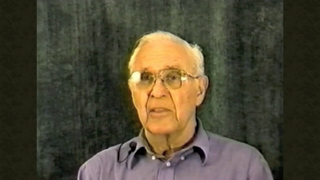9:19 | He was told he would be taken out and shot if he did not reveal information, but captured B-24 co-pilot Robert Purdy would only give his name, rank and serial number. Expecting that fate any minute, he was instead shipped by rail into Germany, where he was interred for the rest of the war. (Interview donated by Margot Smith.) Part 5 of 6.
Keywords : Robert Purdy Prisoner Of War (POW) German interrogation Berlin Germany Royal Air Force (RAF) coffee Barth Germany Baltic Sea Stalag Luft 1 hunger Red Cross cold radio roll call escape tunnel food

On the cusp of the Depression, Robert Purdy's father had a good job in the automobile industry in Michigan, but after the crash, employment became spotty and his family had to move several times to keep afloat. (Interview donated by Margot Smith.) Part 1 of 6.
Robert Purdy describes the intensely political climate during the Great Depression, which had many people embracing leftist ideals. He worked in a tool and die shop preparing for engineering school, and along with his brother Harry, an accomplished writer, began to put those ideals into action. (Interview donated by Margot Smith.) Part 2 of 6.
During a break from his college education, Robert Purdy and his two brothers became increasingly angry about the Nazi aggression in Europe. After Pearl Harbor, all three enlisted in the Air Corps together. He received his wings as a fighter pilot, but losses in the bomber groups required that he move into B-24's. (Interview donated by Margot Smith.) Part 3 of 6.
B-24 co-pilot Robert Purdy says he was scared on every mission he flew over Greece and Italy because every one drew heavy flak and German fighter attacks. During a bombing run over Vicenza, his plane was hit and the crew had to bail out. Captured almost immediately, he was transported into Germany where an uncertain fate awaited. (Interview donated by Margot Smith.) Part 4 of 6.
News of the war filtered into the POW camp where B-24 co-pilot Robert Purdy was interred, and the news that VE Day had come was most welcome. The tunnel digging was abandoned as the war crept closer and closer. Finally, two Russian scouts appeared at the gate. Where were the guards? (Interview donated by Margot Smith.) Part 6 of 6.